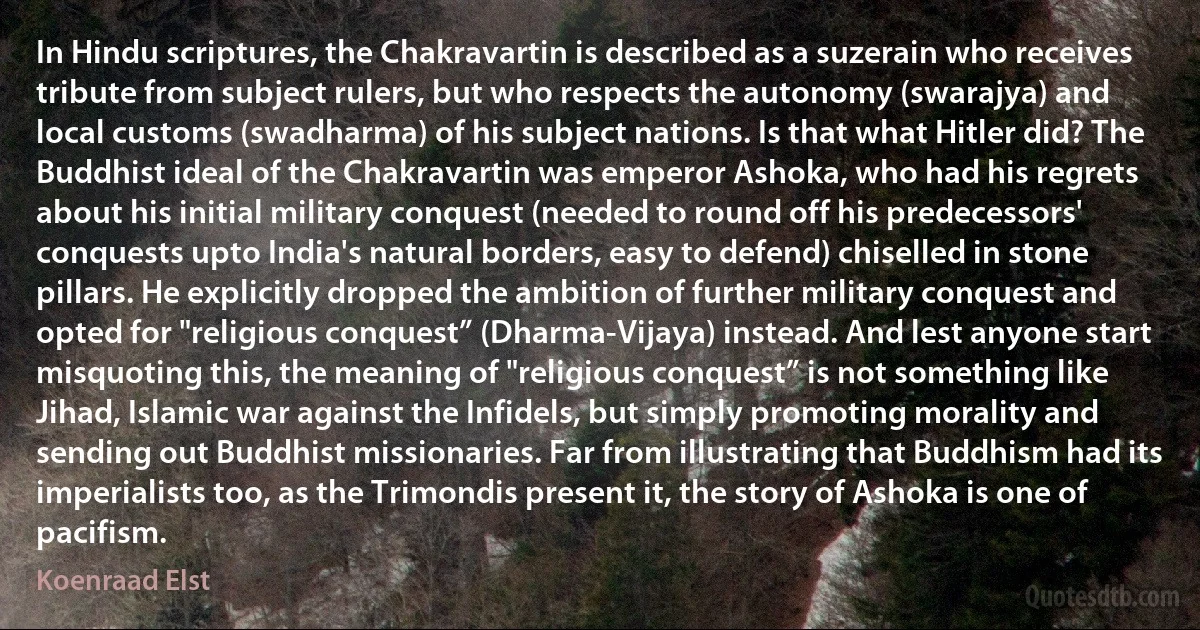
In Hindu scriptures, the Chakravartin is described as a suzerain who receives tribute from subject rulers, but who respects the autonomy (swarajya) and local customs (swadharma) of his subject nations. Is that what Hitler did? The Buddhist ideal of the Chakravartin was emperor Ashoka, who had his regrets about his initial military conquest (needed to round off his predecessors' conquests upto India's natural borders, easy to defend) chiselled in stone pillars. He explicitly dropped the ambition of further military conquest and opted for "religious conquest” (Dharma-Vijaya) instead. And lest anyone start misquoting this, the meaning of "religious conquest” is not something like Jihad, Islamic war against the Infidels, but simply promoting morality and sending out Buddhist missionaries. Far from illustrating that Buddhism had its imperialists too, as the Trimondis present it, the story of Ashoka is one of pacifism.
Koenraad ElstRelated topics
ambition anyone autonomy buddhism chisel conquest drop easy emperor far hindu initial lest meaning natural off present round something start stone story war regrets hitler jihad pacifism islamic customsRelated quotes
He had come to power because he had seen through Hitler from the very beginning- but not, ironically, because his inner light, the source of that insight, was understood by Englishmen. Churchill's star was invisible to the public and even to most of his peers. But a few saw it. One of them wrote afterward that although Winston knew the world was complex and in constant flux, to him "the great things, races, and peoples, and morality were eternal." Isaiah Berlin, the Oxford philosopher, later observed that the Churchill of 1940 was neither "a sensitive lens, which absorbs and concentrates and reflects... the sentiments of others," nor a politician who played "on public opinion like an instrument." Instead Berlin saw him as a leader who imposed his "imagination and his will upon his countrymen," idealizing them "with such intensity that in the end they approached his ideal and began to see themselves as he saw them."

William Manchester
Three conclusions can be safely drawn from a study of these 21 inscriptions. Firstly, the destruction of Hindu temples continued throughout the Muslim rule, from the date of its first establishment at Delhi in AD 1192 to its downfall with the death of the Mughal emperor Muhammad Shah in 1748. Secondly, the destruction took place all over India and was undertaken by rulers belonging to all Muslim dynasties, imperial as well as provincial. Thirdly, the destruction had no economic or political motive as has been proposed by Marxist scholars and Muslim apologists; it was inspired by religious zeal and regarded as a pious performance by Muslim kings and commanders, all of whom took considerable pride in it and sought blessing from Allãh and the Prophet. The iconoclasts, it may be added, have been idolised all along as paragons of faith, virtue, justice and generosity. These conclusions become clearer still when we come to evidence from Islamic literary sources.

Sita Ram Goel
There is no more romantic episode in English history, or in the haphazard building of the Empire, than the story of the "Company of Adventurers of England Trading into Hudson's Bay." To look for the North-west passage while they made profits out of furs, to obtain a charter of sovereignty over the lands which contained all the waters flowing into that bay, and yet to leave those lands unexplored for many, many years- this is a typically British proceeding. They sought the western equivalents of "ivory and apes and peacocks," and they found an empire as a by-product. They created a great tradition, a tradition which is your own to-day, of discipline and endurance round a commercial ideal. They treated the Indians as a source of profit, yet they treated them with justice and with kindliness. They kept one eye on dividends and another on exploration. What race besides our own could be so casual, so far-sighted, so inconsistent and so successful?

Stanley Baldwin
I want to see all Americans have a reasonable amount of leisure. Then I want to see them educated to use such leisure for their own enjoyment and betterment, and the strengthening of the quality of their citizenship. We can go a long way in that direction by getting them out of doors and really interested in nature. We can make still further progress by engaging them in games and sports. Our country is a land of cultured men and women. It is a land of agriculture, of industries, of schools, and of places of religious worship. It is a land of varied climes and scenery, of mountain and plain, of lake and river. It is the American heritage. We must make it a land of vision, a land of work, of sincere striving for the good, but we must add to all these, in order to round out the full stature of the people, an ample effort to make it a land of wholesome enjoyment and perennial gladness.

Calvin Coolidge
At the point at which the concept of différance, and the chain attached to it, intervenes, all the conceptual oppositions of metaphysics (signifier/signified; sensible/intelligible; writing/speech; passivity/activity; etc.)- to the extent that they ultimately refer to the presence of something present (for example, in the form of the identity of the subject who is present for all his operations, present beneath every accident or event, self-present in its "living speech," in its enunciations, in the present objects and acts of its language, etc.)- become non pertinent. They all amount, at one moment or another, to a subordination of the movement of différance in favor of the presence of a value or a meaning supposedly antecedent to différance, more original than it, exceeding and governing it in the last analysis. This is still the presence of what we called above the "transcendental signified.

Jacques Derrida
